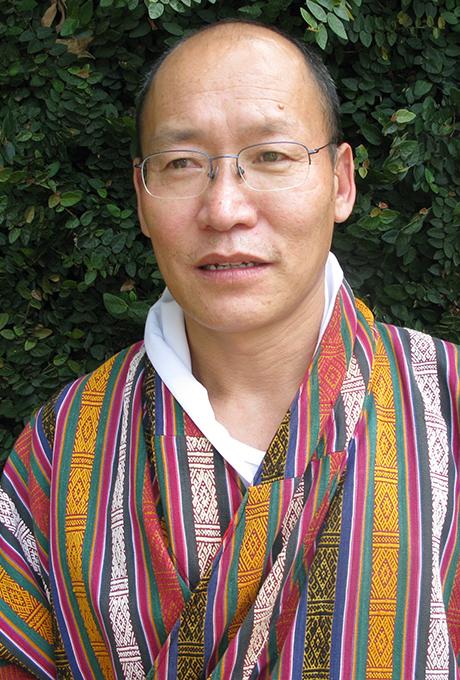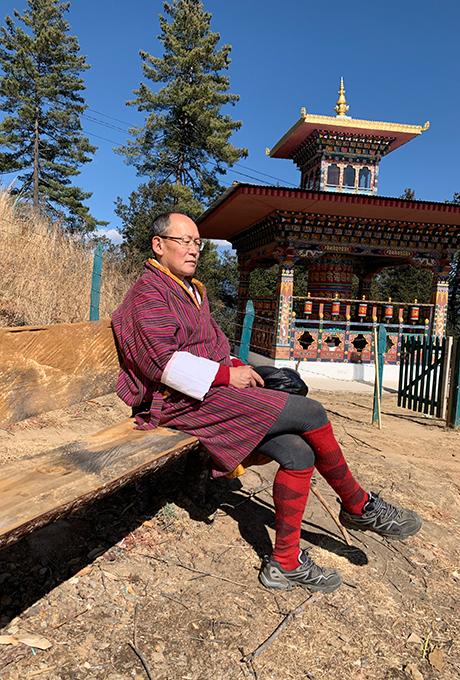Think about death: Dasho Karma Ura reveals a nation's secret to happiness
Dasho Karma Ura, a Bhutanese expert on happiness, tells Anand Raj OK why walking for a few minutes in a forest, doing community activities and enjoying a good night’s sleep every day can improve your happiness levels tremendously. And, oh yes, thinking about death too
"Do you mind if I make myself a bit more comfortable?" asks Dasho Karma Ura.
We were at the Manarat Al Saadiyat in Abu Dhabi earlier this year where Dasho had been invited to share his insights about the ‘mental states connected to happiness’ at the LiveHealthy Festival, a two-day fitness and well-being event.
Seated on a long sofa outside the main hall where the events are happening, the genial president for the Centre of Bhutan Studies and the Gross National Happiness (GNH) Research Centre in Thimphu, kicks off his shoes, smoothly hoists his lower limbs up and makes himself comfortable folding his legs into a half lotus position.
Dasho clearly has been practicing some meditation techniques – his yoga posture, ramrod straight back and the beatific smile playing on his face is proof enough.
One of the world’s leading – if lesser-known – experts on happiness, the 58-year-old has been in the forefront to promote Bhutan’s fourth king Jigme Singye Wangchuck’s development philosophy of Gross National Happiness – an alternative to gross domestic product, the conventional yardstick used to measure a country’s development.
A product of St Stephen’s Delhi, Magdalen College, Oxford, and Edinburgh University, Dasho has, over the past three decades, been involved in carrying out surveys asking his country’s people among other things, how many hours they sleep at night, whether they quarrel with neighbours and the number of friends they have, while developing methods to evaluate their well-being.

Collating the study, five years ago, Dasho’s team published a report that revealed nine out of 10 Bhutanese were "extensively or deeply happy". Among a few interesting pointers that the report threw up: Educated citizens living in urban areas were more content than those in rural areas; and, ahem, men were happier than women.
Before I get him to reveal the secrets of happiness of not just men but women as well, I ask Dasho how he would define happiness.
"It’s a state of awareness and being, which is influenced – and affected – by the physical environment and your own inner self," says the recipient of the Druk Khorlo (wheel of the Dragon Kingdom), the highest decoration from the Bhutanese King. Noticing the I-didn’t-get-you look on my face, he explains. "The external environment may be perfect and conducive for happiness, but if your internal state is not equally perfect, you cannot get the best out of it. A sense of equilibrium is necessary for happiness to thrive."
Dasho should know. He has been managing the GNH Research Institute in the Himalayan kingdom’s capital, Thimphu, for over 15 years.
Although the term Gross National Happiness was coined by Bhutan’s King Jigme Singye Wangchuck in 1972 – in an interview he was quoted as saying "GNH is more important than GDP" – it was only in 1998 that a centre was established to conduct inter-disciplinary studies on Bhutan "for advancing its social, cultural, economic and political wellbeing".
A decade later, Nicolas Sarkozy, the then president of France, commissioned three economists – Joseph E. Stiglitz, Nobel laureate Amartya Sen and Jean-Paul Fitoussi – to submit a report on how useful happiness is in development indices. Happiness quickly began attracting global attention.
Three years later, in 2011, the UN General Assembly happily passed a resolution suggesting that member states include the pursuit of happiness as a fundamental human goal – one of 17 UN Global Goals – in development. The passing of this resolution dovetailed into the annual observance of the International Day of Happiness on March 20.
But should the pursuit of happiness be the purpose of life, the goal, really? I ask Dasho.
"In life, there are many engaging goals," says the Bhutanese, after mulling over the question for a while. "Happiness is one among them." There may be occasions when the pursuit of excellence could affect a person’s happiness in the short term as it might involve self-sacrifices of some kind; or there may be services for the family or for community that may also reduce one’s own happiness. "These are conflicting values in life," he says. "But one of the evaluations that we humans carry out [as we approach our end] is whether we have been happy or not in our life. And that’s a general feature of humans. So happiness is a popular and common yardstick in life."
Does that put us under some pressure to be happy at all times? I ask.
"Certainly we have far more choices, far more opportunities thanks to what we call modernisation," says Dasho. While we have a plethora of opportunities as consumers and our income has gone up, there is some amount of compulsion that at least a portion of it has to be converted into well-being; and happiness is considered the eventual pinnacle of wellbeing, he says. "So in that sense, yes, everyone’s aspiration [to be happy] has been heightened."
But there is a catch. ‘Some people may not achieve it. They may enjoy a high living standard but may not feel completely well when they check their own awareness. That’s the paradox. They may experience a sense of wanting at all times.’
Dasho wants a cup of coffee at this time and together we head to a nearby coffee kiosk for a cuppa. Even as he is happily relishing a café latte, I ask him if he can list the ingredients for a happy life.

"We Bhutanese believe we need both material and non-material things," he says. In simple terms, things money can buy and things it cannot. "And they are not substitutable." The basic error people make is in believing that if they have sufficient money, they can substitute everything by buying or commanding for things.
Many aspects of cultural life or those related to the family or those that exist in a certain environment cannot be obtained from a market in exchange for cash, he insists. "Money cannot buy everything; there are certain things that are beyond and besides money." Dasho may be right. A 2010 Princeton University study found a correlation between happiness and wealth. People’s happiness increases up to a point of around $75,000 per year after which, the researchers found, happiness levels don’t go up with increase in wealth. But just in case those earning more than $75K plan on giving away their money, the study also found that the lower a person’s income, the worse they feel.
Money can buy happiness
A 2008 US study reported in Science, however, found that money does buy happiness – but only if spent on someone else.
Yet another study found that people who value time over money are generally happier than those who chose more money, although (and not surprisingly) a majority surveyed preferred having more money over more time.
Keen to know how much of money I should be having to become happier than I am now, I pose the question to Dasho.
"It’s difficult to extrapolate what life should be based on the Western economic status," Dasho says, sipping his coffee. "We all cannot be earning $75,000. Also, the Western life as you know is ruining the earth. It’s not possible to believe that [the Westerners’] life is the happiest. We already know the downsides and demerits of it."
Reluctant to offer a generalised financial threshold he makes it clear that there are large swatches of people who are "happy living with just $1,000 a year at the local purchasing power". Living standards that are adequate for a person, he says, also depends on how much the government guarantees in terms of health, education and other services.
Another major factor that can spike happiness levels is positive interactions with the community. For people to be emotionally secure, they should be offered opportunities to participate in the community and culture for which an institutional set up is crucial.
"Community is extremely important," stresses Dasho. "We find meaning in engagement. What is important is the amount of free time you give to social activities."
I ask Dasho why Bhutan – although its kings laid great stress on happiness – ranked 95th in the 2019 UN World Happiness Report.
Provided by Gallup Poll, the survey was based on a questionnaire of six key variables that support well-being: income, freedom, trust, healthy life expectancy, social support and generosity – using a scale from 1 to 10 with 10 being the happiest. Scandinavian countries, including Norway and Denmark, happily took the top five positions.
"Although it is very cheap to administer, the survey doesn’t tell a lot," says Dasho. "There are problems with these measurements as in whether they are representative."
An Asian person’s score of six and an American’s eight may roughly be the same when you adjust for cultural variations, he says. "So, I’d say Bhutan might figure in the 20s when we adjust for such variations."
He is spot on. The 2015 GNH survey done by the Centre of Bhutan Studies revealed a score of 6.88, which puts the Himalayan kingdom around the 20th position in the Global Happiness Report 2019.
But this figure is very close to high-income levels and Bhutan does not boast a very high-income population, I point out.
"You are right," he replies. "So, this means there are other configurations which need to be taken into account."
Unlike the GHR Index, the GNH surveys an individual’s life in nine spheres, including psychological well-being, ecological diversity, time use and community vitality using more than 130 variables.
"Bhutanese feel very secure," says Dasho. "They may not have a lot of savings but they are secure that nothing will go wrong with the country. The leadership quality is good, just like that in the UAE.
"They are also psychologically robust thanks to the practices of meditation. The nation is also environmentally rich – anyone can access a forest within five minutes. It’s like living in a park."
Forests have a huge role to play in helping people destress and it has been found that living in close proximity to green environs can benefit mental health of people.
Among other factors that boost the happiness index among Bhutanese are the education and health services, which are free of cost, a strong sense of community, and an excellent quality of health that they enjoy. A reason for the last one is a simple and free-of-cost ‘pill’ – Bhutanese sleep well. In a survey, a large majority responded that they enjoy eight hours of sleep a night.
"Sleep is one of the most important elements of a happy life," he says. "It’s vital. Poor-quality night sleep can colour your next day leaving you unable to appreciate the day. This is a bane of modern life." He blames social media addiction for "eating into your sleep time".
Other reasons Bhutanese enjoy high happiness levels are because they socialise well – a minimum of 37 minutes a day, says the survey – their sense of hope and optimism is high, and they are healthy. "We found that on average, an individual is healthy 29 days in a month. Quality and adequate sleep, again, have a role to play here."
Causes of unhappiness
What could make people unhappy? I ask.
"Uncertainties," says the cheerful man. "Among Bhutanese, we found that disability can have a profound effect on happiness. Second is divorce."
While the happiness levels of those who are unmarried are similar to that of married, a divorce can send the levels plunging – and among men, not just because of the alimony payments but issues related to loneliness. "A divorce can cause irreversible damage to happiness," he says.
Not having a spouse or loved one to share your thoughts and secrets, troubles and joys with could leave you low, agree experts. Those who are unable to handle anger issues can find their happiness scores taking a beating as do those with poor social connections.
I gently mention that people are now busy sharing more than their thoughts with ‘friends’ in the virtual world.
Dasho frowns. "The happiness you get from sharing things on social media is not durable," he says, insisting that digital detox is the need of the hour. "Getting off social media is going to be a challenge for the youth. Social media addicts lose appreciation for healthier, happier things."
Before I prepare to wind up the interview, I ask Dasho to share with me his formula for happiness.
"I don’t know if it’s a secret really," he says with a smile. "But it’s extremely simple. Sleep well, eat with care, meditate about 30 minutes every day to free yourself from obsessive thinking, spend about an hour in social service, an hour doing physical activity and, at the end of the day, be grateful and count all your blessings.
"Think about death at least once a day; it will help you stay grounded.
"So, in simple mathematical terms, six hours of family time, plus seven hours of sleep, plus seven hours of work equals happiness."
Does he manage to follow this? I ask, as he unfolds his legs and begins to slip on his shoes.
Dasho smiles. "I enjoy a profoundly deep 6-7 hour sleep," he says. "I work hard, spend time with the family and go for a 30-minute afternoon walk in the forest almost every day. And, oh yes, I think about death often."
Disciple of happiness
Dubai-based managing director of Danube Group, Anis Sajan, would agree with Dasho regarding a healthy body and mind being crucial for happiness. A fitness enthusiast, he is convinced that one of the best ways to be happy is to be fit and healthy. To that extent he enjoys practicing yoga "for at least 90 minutes every morning. Yoga makes you energetic and fresh to face the day", he says. "And if you are healthy and happy you will be able to spread the positive vibes wherever you go."

He recalls how he used to struggle with migraine issues until he started practicing yoga. "Now I have been able to reverse it completely. And that has surely made me a lot happier."
Anis believes that only a happy boss can helm a happy team and vice versa. "If my team is happy, that makes me happy. As they say in sports, the captain is as good as his team. I need to ensure the environment is happy and one in which people love to work. A happy team will be a productive team."
To spread the happiness among his staff, Anis launched a laughter therapy workshop a few years ago. "Twice a week, all our staff gather for a laughter class," he says. "We laugh for 10 minutes unconditionally." He says he has noticed a positive difference in the staff morale and optimism levels since the introduction of these sessions.
Is there a formula for happiness?
"Yes," says Anis. "Stay healthy, think positive, spread positivity, work hard and exercise regularly. Follow this and you’ll surely see a rise in your happiness graph."